The dairy category isn’t just a staple part of all c-stores – it can set the tone of an entire store, according to some retailers. And this is why…
When it comes to convenience retail, the dairy category is definitely the big cheese in today’s chilled selection.
According to HIM, 99% of retailers say that the category is important in their stores, and it’s not hard to see why. Milk is the second most bought product in convenience overall, and is the main reason that most consumers get off their sofa to visit a shop in the first place.
And while milk may be the biggest single driver in-store, other dairy products can be just as important. After milk (which makes up 79% of sales in the category), HIM says that cheese accounts for 12% , yogurt 9%, butter 8% and flavoured milk 2%.
Yet all is not peaceful in the dairy pastures. Any retailer who has read the headlines in the past couple of years knows these steady sales aren’t translating into an easy time for UK dairy farmers. The industry is volatile: last year UK skimmed milk prices hit a 10-year low, and both Arla and Müller slashed their own milk prices this spring.
These concerns might appear entirely academic to big city c-stores, but for shops in rural locations it’s a different matter.
Dan Cocks from Premier Whitstone Stores in Devon understands that most of his customers come from a community with deep historical and personal links to dairy farming.
“Where we are in the West Country means that we’re surrounded by dairy farmers, so everyone around here knows a lot about milk and exactly where it comes from,” he says.
Dairy made close to home
According to Mintel, dairy brands will have to go even further to promote their fairness to farmers in the future, but that’s not going to be necessary at Our Cow Molly.
The Sheffield dairy farm, which retails home-produced milk and ice-cream to the local area, won a Future Food Award recognising its entrepreneurial spirit at the BBC Food & Farming Awards earlier this year.
Our Cow Molly founder Eddie Andrew says: “We don’t necessarily think we’re the future – producing milk and supplying it locally is something we’ve been doing for years – but now it appears people are beginning to catch up!”
Our Cow Molly recently made a deal with Co-op to supply stores around Sheffield. Yet its success has been based on customers at cafés and independent c-stores. One of the first was The Village Store Endcliffe. The store’s Vanessa Cutler says: “We’ve been selling the ice cream for a few years,” she says. “It’s very popular: one of the reasons is it’s local, and you can definitely tell the difference between Our Cow Molly and other brands.”
Andrews adds: “What customers really like – apart from the freshness of the product – is that the money they spend stays in the city. It goes to support people in Sheffield 100%.”
With this in mind Dan works closely with the local Trewithen Dairy to stock regionally-sourced milk, butter and cream.
“People really like it because of the heritage, the authenticity and the traceability – they know it’s a genuine local product and are more likely to buy it,” he says. “Also, the quality is there so they don’t mind paying a bit more. As a store, we say that our milk might not be the cheapest on offer, but we believe in paying a fair price and the farmers being paid properly at the other end.”
Frozen yogurt licked
“It’s lovely to see how many convenience stores are stocking our products,” says Thomas Lavis, marketing manager at British frozen yogurt brand Lick.
“I think it’s because retailers are always looking for interesting brands with a point of difference – and so are shoppers, otherwise they’d be at the supermarket buying whatever was on offer there.”
Lavis says Lick aims to be distinctive not just in its quirky marketing and product design, but in the way it’s made.
“We use a patented production method which means that Lick is made from 100% yogurt,” he explains. “When you look at competitors they tend to be about 63%, which gives us a great USP.”
The brand slots into a sweet retail spot between health and indulgence: it’s fat-free and low in calories, so is often recommended by weight loss groups as a healthier alternative to ice cream.
“In America, frozen yogurt is in the mainstream – people go out for it socially like they do with ice cream,” says Lavis.
However, this ethical and farmer-first approach doesn’t mean ignoring the value offer entirely. Dan says that some people still want a budget product and so stocks a limited amount of Euro Shopper milk, which he says “doesn’t really get a huge amount of space in the store”.
He’s also worked with Trewithen Dairy to secure a generic Cornish milk which has local credentials, but a more budget-friendly price point. “We got it on the shelves for £1.09 – which I was very happy with indeed.”
As an essential everyday product, milk has always been used as cannon fodder in the supermarket price wars. And away from the local angle, more c-stores are competing with the multiples by stepping up the volume and lowering the price of their stock.
“We sell our milk at 2ltrs for £1,” says Jatinder Sahota from Max’s Londis, on the Isle of Sheppey in Kent. “It’s fantastic because our milk sales have really shot up and we’ve worked out how much we have to sell to make the same margin as before.
“Basically, I’m making as much profit, but now we’re shifting real volume. We like to keep the prices reasonable and drive that through volume to make margins back.
“Customers come in and through the £1 2ltr bottle they’ll go on to buy other things as well,” he says.
Retailers such as Jatinder also understand that milk isn’t purely about margins. He’s seen how customers will pop in for a pint of milk and leave with a full basket, plus a good idea of the scope of what his shop sells.
“That means we always have to price it right. And it’s important we put it in the right place, too. There’s no point in sending customers wandering around the whole shop looking for it, so we don’t put milk in the back. We have it in the middle of our fresh aisle so customers can get what they need quickly. This also helps promote additional impulse purchases, which really boosts basket spend.”
David Charman, from Spar Parkfoot in Kent, adds that the right milk offer goes beyond meeting an everyday customer need – it sets the tone for the whole store.
“We sell a huge amount of milk – and we’re just about to lower our prices and offer a ‘2 for £2’ on 2ltr milk, which is becoming much more the norm in the supermarkets,” he says.
“We’re saying to customers: ‘Look, we’re the same price as the supermarkets give or take a couple of pennies. And that means because you can trust us on the milk you can trust us on everything else we sell in the store, too’.”
David believes that if you’re going to do volume, you’ve got to get the milk out on the shop floor rather than leaving it languishing in the stock room. He says this gives the message that shoppers will always get what they want when they come through the doors.
“When shoppers come in and see 50 2ltr semi-skimmed and 30 or 40 2ltr bottles they’ll think: ‘Okay, there’s a lot of fresh milk here – there’s every possibility that if I come along on a Sunday afternoon then they’ll definitely have some’.
“Some stores have less space and, yes, they fill up milk three or four times a day, but I don’t think it creates the same impression of availability that we go for.”
Though supermarket-like availability might be key for milk, in other dairy categories Dan has found that it pays to strip the selection back to basic best-sellers. “Things change in every category, and we regularly take time to look at everything in the shop to see what’s selling and what’s not, over time,” he says.
“Less can be more, and we’re making more space for the lines that do sell.”
Dan adds that his butters and spreads selection is a good example of this process in action. “We’ve cut the range right back, to Lurpak, Clover, Utterly Butterly and own label. People have a shortlist of three of four in their heads and if they can’t get their first preference they’ll normally go for their second or third. Only after that will they not bother at all.
“Promotions do help – we’ve had Clover on at 500g for £2 and that’s astronomical when it’s on offer –there’s massive, massive volume.”
Deli style and old favourites are big in cheese
Customers’ evolving appetite for deli-inspired cheese is opening the market for more premium choices. Brands such as Quicke’s (which won Best English Cheese at the British Cheese Awards) are making moves to connect with c-store shoppers looking for something new.
“In 2015 we underwent a rebrand to make the Quicke’s brand more easily identifiable,” says sales and marketing manager Tom Chatfield. “Each pack is colour coded and highlights key information such as how long each cheese is matured for. The new designs introduce a more contemporary look and feel, while reflecting the family’s farming heritage.”
David Charman of Spar Parkfoot in Kent is keen to stock a wide range of deli-style cheeses.
“As well as standard cheese from Spar we have two local companies that provide us with speciality cheeses on a weekly basis,” he says. “We have some unusual cheeses in stock. People try cheeses abroad and then want to have them at home as well.”
Away from the more exotic cheese choices, there’s still room for good old-fashioned Cheddar.
“Cheddar dominates the UK convenience cheese market at 56% of all volume and 52% of all value and, as such, it is a must-stock for retailers, with block being the predominant format (IRI),” says Amy Fisher, central shopping manager at Dairy Crest.
“Cathedral City is bigger than all other Cheddar brands combined,” she adds.
Dan says that throughout the dairy category he’s seen good business in both the premium end and the budget end of his range. So while he does well with locally-sourced premium ice creams from a local company called Farmer Tom’s, Booker’s own-brand ice cream does well in the summer months, too. It’s a similar story in cheese, where sales of high-end Cornish Yarg, Cornish Brie and other artisan choices outperform the more standard block options unless a promotion is involved.
“Premium and budget are doing well – it’s the middle ground that’s suffering at the moment,” he says.
Whatever the price, dairy won’t sell unless the category is presented perfectly in the chiller, which can be hard work for staff on the shop floor.
“To be honest, at our store we’ve realised what a time-consuming category it can be to maintain,” says Jatinder at Max’s Londis. “As we’ve got busier in chilled and fresh we’ve had to employ more people – and there’s so much to do in terms of rotation of stock and making sure that you check dates.”
“You also can’t underestimate the fact that when deliveries come in you’ve got to have the people to get stock from the lorries and into the chiller as quickly as possible.
“So, there is an extra cost in terms of labour, but it’s more than worth it for the margins involved and the quick turnover of stock. If it’s managed right it’s a really good earner.”
Of course, cleanliness in the category counts for a lot, too – especially in a section where spilt milk could mean lost sales if it’s not cleaned up and sorted out fast.
Dan says that in his store the chillers have to be cleaned “religiously” and he makes sure that they come up to par every day.
“There’s nothing worse than a slightly manky chiller,” he says.
The evidence that retailers are willing to go the extra mile to make dairy look good is further proof of how c-stores are evolving for changing customer needs. Today shoppers are looking for more than somewhere to grab some bread on the way home from work – they expect a range of exciting fresh and chilled food options, too.
“We’ve been here 27 years and we’ve seen how shoppers’ habits are changing,” says Jatinder. “We’ve worked hard with Londis to create more room for chilled so we can do much more than the usual milk, bread and basic fruit & veg.
“As part of that we’ve gone from 6.5 metres of refrigeration to 15 metres minimum. I believe we’ve now got more space for chilled than we do ambient. That means we’ve now got a whole chiller full of yogurts. And we do loads of Dairylea, Babybel and other snacks that can go in the kids’ lunch boxes. If it’s good enough for the bigger supermarket c-stores, it’s good enough for us!”
David agrees, adding: “Dairy is probably the most important part of what we’ve done as a store. Basically, it marks the difference between your standard c-store and a destination where people can pop in and choose food for lunchboxes, evening meals and everything else.”
Greek gods
Greek is the one to beat in the yogurt category, with Kantar reporting that a third of yogurt sales in the UK are now Greek-style. Organic brand Rachel’s is the latest big name to go Mediterranean, with two new Greek-style flavours for its breakfast pot range: natural and honey.
The move towards Greek-style is driven by consumers’ desire for healthy formats, a trend which is benefiting sales of natural yogurt, too.
“Natural yogurt is the third largest yogurt, growing at 13%,” says Laura Graham, head of marketing at Emmi UK. “Onken Natural Set 500g is the second ranked, branded natural SKU. The product works well in both savoury and sweet recipes.”
Meanwhile, big is beautiful in the chiller, as big pot yogurts (packs over 450g) grow 10.1% year on year (Kantar). The format has helped boost profits at Lancashire Farm Dairies.
“The range we offer taps into what consumers are seeking out,” says Azhar Zouq, managing director. “Yogurt is now no longer seen as just an on-the-go snack, it is now being purchased as a product that can enhance the flavour of a variety of dishes.”
Special Yollies
Kerry Foods aims to take its popular yogurt-on-a-stick product to the next level with Yollies limited-edition banana flavour – a taste which scores highly with both parents and their kids as a healthier after-school treat.
Dairy delights
To celebrate its 35th anniversary, dairy drink brand Nurishment is running an Anniversary Arcade promotion giving shoppers the chance to win hundreds of prizes including tablets, smartphones, games consoles and music vouchers.
Eco cheese
Independent cheese producer Wyke Farms is showcasing its green credentials with triple certification from The Carbon Trust. The farm is already run on 100% green energy, part of a long-term strategy for sustainability.
Snacks on the moo-ve
The Laughing Cow has added extra interest to its cheese snacking range with Mini Cravings. The line features Cheddar, smoked cheese and blue cheese to savour on the go.
Championing chilled
To help c-stores make the most of dairy, Kerry Foods has created a website for retailers to access planograms, category advice and chilled food insights. Go to www.chilledexperts.com.





















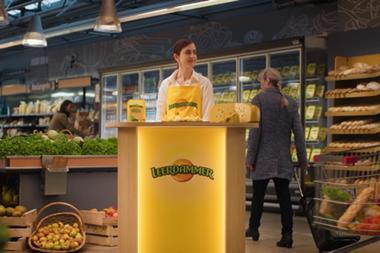
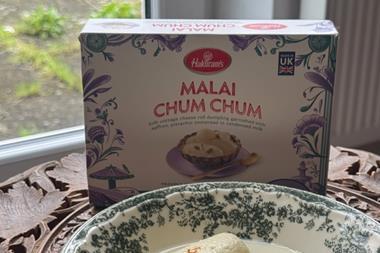
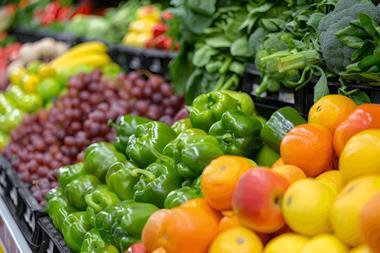
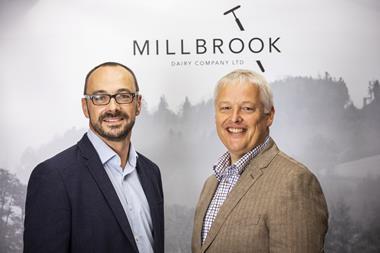
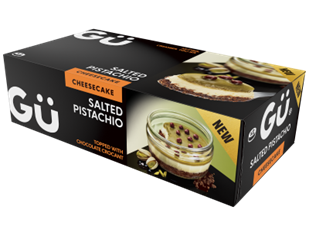
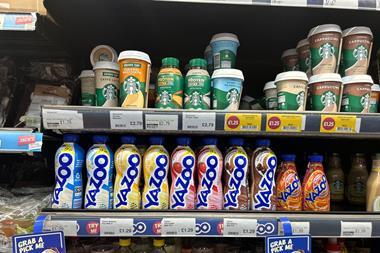
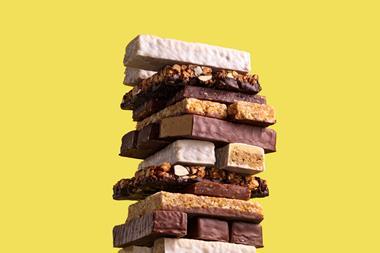





No comments yet